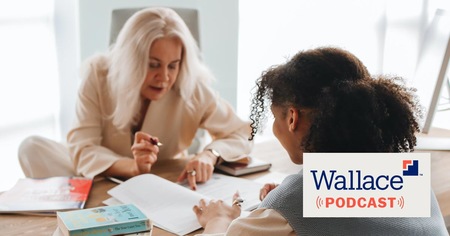"We know that our emotions so directly impact our ability to learn and connect with each other," said Newman, who prompted attendees to share how they were feeling and to look at the bigger picture while recognizing conditions for learning and what we need to be able to learn effectively is vital. "Throughout AIR and a lot of the meetings we've been in, we've started sitting with our emotions at the beginning just to open ourselves up and also let us know where everyone else is."
Warner agreed and noted that we cannot achieve the desired outcomes for young people without adults who are practicing and understanding their social and emotional needs. Newman stresses that it's important for adults to recognize that you can't pour from an empty cup.
"At the end of the day, we all need to feel physically and emotionally safe, supported, that we can be who we are, as adults so that we can then create the optimal conditions for learning a development, whether that's academic learning, social and emotional development, what have you," said Newman. "What is it that we need to fill our cup? If you're in the position of working with adults who work with young people, asking them: 'How are you doing? What has your experience been?' and trying to not only build trust and connection, but leverage the voices of people around you to then provide what they need—as opposed to just coming in and thinking you already know what they need."
Warner echoes that SEL are consistent actions we take every day and asked Grace to share how, from a therapist perspective, things are being handled. Grace says she's humbled to be able to offer help for not only young people, but also afterschool professionals and providers.
"We're seeing so much. People are just generally overwhelmed, which is completely understandable," said Grace, adding that the fear of the unknown is very disorienting for people. "People are really looking for certainty and stability, and feeling validated in their emotions.
"Some of the things we're doing at NJSACC is holding open provider calls—which we're calling Afterschool Conversations with NJSACC—where providers from both ends of New Jersey, different types of programming, are able to share their experiences, questions, expertise, challenges and feelings they're having about the impact of pandemic."
Grace adds they're also able to share with one another what they're doing.
"So during those afterschool conversations calls, we provide updates of what's happening in the state and we try to give as much concrete information as we can," said Grace. "But as we all know, right now we don't necessarily have a lot of concrete information. What we do is try to bring on additional providers within the state that are able to provide additional resources."
This includes mental health services, childcare health consultants, and more. As a family therapist, Grace touched on the self-care workshops she offers and explained why the practice of self-care is so important.
"I always to try to offer self-care workshops and presentations focusing on ourselves as holistic beings," said Grace.
Newman notes it's an interesting time to be working in the out-of-school-time field.
"If you look at the reopening guidance, what we saw very clearly is this emphasis on the whole child—social and emotional learning, conditions for learning, mental health trauma," said Newman, adding that this is what's bubbling to the top and that it's important to recognize this is something the out-of-school time field does very well. "Now is really the time for us as a field to step up. More than we ever, have before and make it known what we can contribute and the critical role that we play."
It's important to note the commonly seen message of "we're all in this together" in relation to the pandemic, many young people have not experienced the same thing and their experiences are very different from one another.
"We have to go back to helping young people feel safe, feel connected, feel belonging, and I think that's what we felt like the afterschool experience in the program gave to children that might not have that at home or have that in school," said Warner.
"With children, have the most clear and transparent conversation with them as you can," said Grace, adding ways to increase socialization. "Even though life has changed dramatically for them in such a short amount of time, acknowledge their feelings and then just be creative about how we're able to give them a little bit of what they've had before, or in different ways."
Every emotion that you feel, Grace says, is normal.
"It's really important to acknowledge those feelings and what triggers those feelings, because with awareness becomes action," said Grace. "Learning how to recognize what those emotions are and then being able to say it's okay that I feel that way. How do I move forward with that emotion? So really just being able to accept and acknowledge those most as human and normal and not being hard on ourselves and giving ourselves some self-compassion."
"How do we help adults understand that it's important to put their emotions out there?" said Newman, touching on the ways in which we can get resources into the hands of those who need them. "That's really something that we're going to have to think about is, in terms of how we get resources out to folks to be able to recognize your emotions and acknowledge that we need to make space for that kind of being uncomfortable."
Relationship building will be huge.
"I don't think we can underestimate or undervalue the power of relationships, not only between adults and young people, but adults with each other," said Newman. "There isn't a one-size-fits-all approach to relationship building."
Ultimately, simply listening and offering a voice to both young people and staff is vital.
"The emotions that are evoked in us now are very, very different than what happened prior to the pandemic. And tomorrow, it could be something completely different and we learn new skills," said Grace. "We just have to have patience with ourselves to be able to learn those skills. With self-awareness, there's knowledge and with knowledge, there's power to make an embrace the change that we need.
"it's just all about what we know about ourselves and it's going to be different for everyone, but that's why I really encourage people to talk to others. Talk to a therapist, talk to a friend, talk to a spouse, a parent—whomever it is to have that support."
"We want to go back to something better than normal, and it's on us to figure it out for ourselves, for our teams, and for the young people we serve—they need us more than ever," said Warner. "I see all the work you're doing and please know that we're here to support you."
To dive deeper into SEL, see NAA's SEL to the Core.
Courtesy of NAA.




